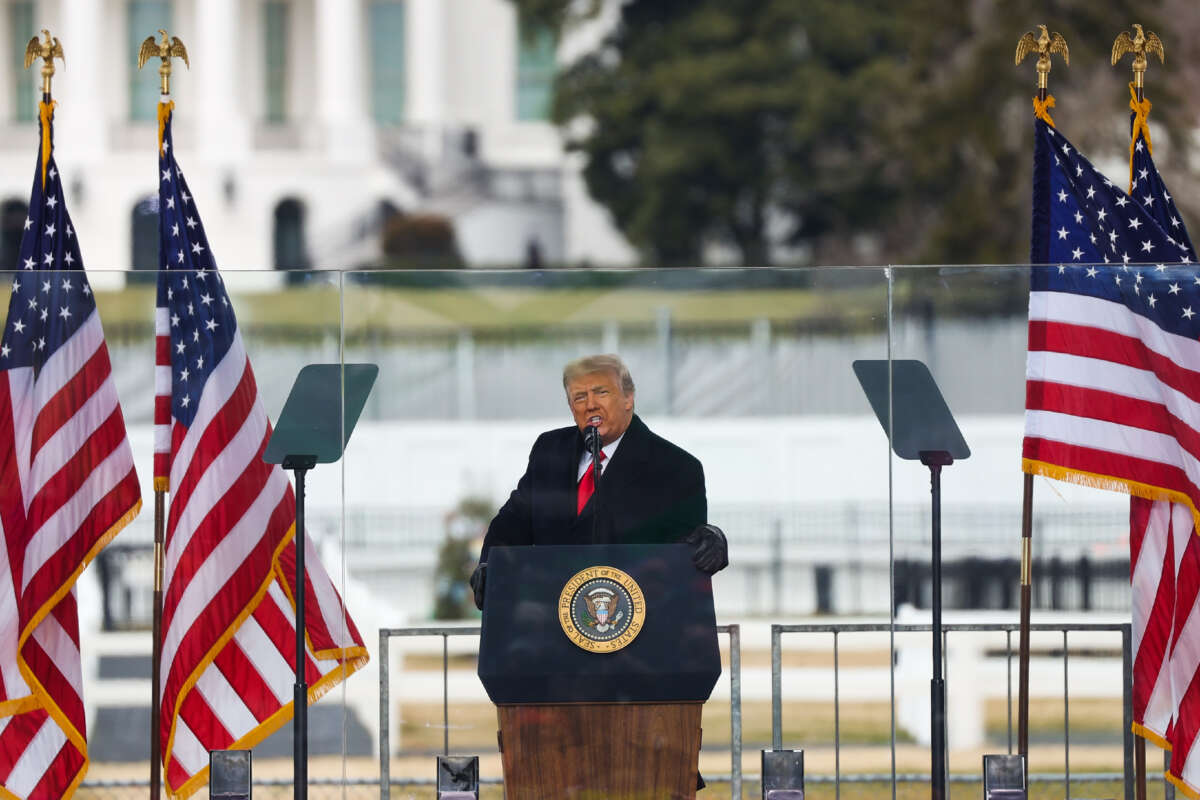Lawyers representing the Department of Justice (DOJ) announced on Thursday that lawsuits alleging that former President Donald Trump instigated the January 6, 2021, attack on the U.S. Capitol building can move forward, as his immunity claims are not valid.
Trump has tried to argue that he cannot be sued because his “Stop the Steal” speech outside the White House the day of the attack was part of his presidential duties — a claim that has repeatedly been questioned by legal experts.
Lawyers from the Justice Department’s Civil Division said in court filings this week that Trump’s speech was not protected from legal scrutiny.
“Speaking to the public on matters of public concern is a traditional function of the Presidency, and the outer perimeter of the President’s Office includes a vast realm of such speech,” the department said. “But that traditional function is one of public communication. It does not include incitement of imminent private violence.”
“No part of a president’s official responsibilities includes the incitement of imminent private violence,” the DOJ added.
The DOJ said that presidents may at times “use strong rhetoric” that could potentially inspire people to “overreact,” but noted that presidents could still be shielded from liability if they were acting in their official capacity. Allowing January 6-related lawsuits against Trump to move forward will do no harm to that standard, the agency added.
“Just as denying First Amendment protection to incitement does not unduly chill speech in general, denying absolute immunity to incitement of imminent private violence should not unduly chill the President in the performance of his traditional function of speaking to the public on matters of public concern,” the DOJ filing said.
Two police officers and 11 Democratic members of Congress are suing Trump under the provisions of a law that was passed after the Civil War in response to attacks by the Ku Klux Klan. The law allows lawsuits against individuals or groups whose threats or actions have interfered with government officials’ attempts to carry out their duties.
During his speech on January 6, 2021, Trump riled up a mob of his loyalists, pushing false claims that his loss to President Joe Biden in the 2020 election was the result of widespread fraud. After blaming Congress and his then-vice president for not doing “the right thing” — referring to their refusal to overturn the election — Trump ordered his mob to go directly to the Capitol, where they violently breached the building and disrupted the certification process of the Electoral College.
The statement from the DOJ is the first time the department has addressed the question of Trump’s legal immunity claims.
In response to the filing, Trump posted a statement from a spokesperson on his Truth Social website. The statement wrongly characterized his speech as peaceful and claimed that it could not be the basis of a lawsuit relating to the attack because Trump was president at the time.
“The D.C. Courts should rule in favor of President Trump in short order and dismiss these frivolous lawsuits,” the spokesperson said.
But even if Trump were acting in his presidential capacity, the standard he claims he’s protected by does not allow any president to behave in such a manner, the department said.
“[A]ctual incitement would be unprotected by absolute immunity even if it came in the context of a speech on matters of public concern,” the filing stated.
Several legal experts have noted that the DOJ’s filing will likely have consequences beyond holding Trump accountable in civil lawsuits, and could influence possible future criminal cases against him.
The DOJ’s opinion has a significant “bearing on both the upcoming Georgia indictment of Mr. Trump and Special Counsel Jack Smith’s likely indictments as well,” Harvard Law School professor Laurence Tribe wrote. “Looks bad for the former POTUS.”
“This DOJ opinion helps clear a path for criminal indictments,” said NBC News legal analyst Glenn Kirschner.
Trump is silencing political dissent. We appeal for your support.
Progressive nonprofits are the latest target caught in Trump’s crosshairs. With the aim of eliminating political opposition, Trump and his sycophants are working to curb government funding, constrain private foundations, and even cut tax-exempt status from organizations he dislikes.
We’re concerned, because Truthout is not immune to such bad-faith attacks.
We can only resist Trump’s attacks by cultivating a strong base of support. The right-wing mediasphere is funded comfortably by billionaire owners and venture capitalist philanthropists. At Truthout, we have you.
Our fundraising campaign is over, but we fell a bit short and still need your help. Please take a meaningful action in the fight against authoritarianism: make a one-time or monthly donation to Truthout. If you have the means, please dig deep.
